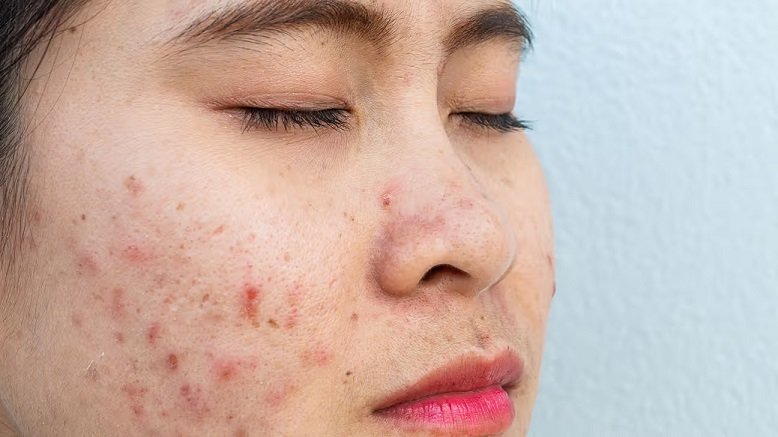Skin conditions can differ in symptoms and intensity. Dermatology disorders can be situationally induced or genetically acquired. Here are two skin conditions that a dermatologist may treat:
Acne
Acne is a skin condition that leads to pimples, mainly on the face. The condition causes skin inflammation, where the hair follicles clog with oil, debris, or dead skin. Some acne types include whiteheads, which are swells filled with pus on the surface. Blackheads also form a bump with a tiny black speck that appears on the skin. A papule appears as a red swell that usually looks tender and doesn’t carry any pus. Pustules filled with white or yellow fluid may appear severe but don’t usually cause much pain. Other types of acne include nodules, which are large inflamed spots on the skin, and cysts, which are large swellings containing high amounts of pus compared to smaller acne spots.
Hormonal changes such as puberty, menstruation, and pregnancy frequently are the cause of acne breakouts. Diets that are rich in sugars, dairy, and carbs can trigger flare-ups in people with existing acne. Acne treatments are usually customized for each patient after the dermatology specialist identifies the type and extent of the acne. The doctor may recommend oral medication and topical antibiotics. Another potential treatment includes light chemical peel therapy. Chemical peels involve removing the top old skin layer to allow new skin to grow. When bacteria or infections cause acne, prescribed antibiotics can block, destroy, or prevent the bacteria from increasing.
Eczema
Eczema is a skin condition that results in dry and irritating patches on the skin. The symptoms usually flare up when you come into contact with an allergen. This condition often weakens the skin and prevents it from helping the body maintain moisture and giving it protection from external elements. Types of eczema include nummular eczema, dyshidrotic eczema, atopic dermatitis, and contact dermatitis. Some symptoms of eczema consist of red patches on the body, rough skin, tiny pus-filled swellings, skin sensitivity, and flaky patches. Eczema may be caused by a hyperactive immune system, depression, ecological factors, and genetic disparities. People with allergies and anxiety are at more potential risk of eczema.
Some people can be affected by the weather and experience drier skin during cold seasons and irritation during warm weather. Makeup and skincare items, clothing fabrics, soaps, and pollutants might also trigger eczema. Foods such as dairy and proteins can cause allergies in people with this condition. A dermatologist can conduct blood tests, a thorough examination, or a skin biopsy to determine the dermatitis type. The doctor may then recommend treatments such as topical antibiotics, oral medications, and corticosteroid creams to reduce irritation. Other eczema treatments include calcineurin interceptions that help to minimize itchiness. Doctors might also recommend that patients with eczema avoid allergens such as detergents, perfumed soaps, and deodorants to inhibit breakouts.
Consult a Competent Dermatology Specialist
Dermatologists treat skin, hair, and nail disorders by carefully evaluating patients to determine the cause of their conditions. The treatments they recommend can improve skin sensations while also reducing the appearance of hyperpigmentation. If you have a severe skin condition, consult a qualified dermatology specialist to customize your treatment.










